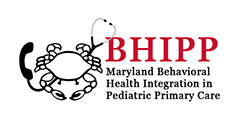855-MD-BHIPP
855-632-4477 M-F 9AM-5PM

BHIPP Resilience Breaks
About BHIPP Resilience Breaks
BHIPP has launched a series of interactive, web-based learning sessions called BHIPP Resilience Breaks. These sessions are a virtual space for pediatric primary care and behavioral health providers to connect, learn and share about strategies, practices and resources to promote mental health and resilience among children and families as well as providers. Free CME and CEU credit is available for participation.
See below for recordings, slides and resources from each BHIPP Resilience Break session.
For questions, please call the BHIPP line at 855-MD-BHIPP (632-4477) or email [email protected]

Session 1: Healthy Routines & Strategies to Support Families Working & Learning from Home
- Slides
- Full Recording
- Creating a Flexible Daily Schedule (pdf handout)
- Breathing Exercises (pdf handout)
- Resources for Safe Online & Offline Activities for Children (pdf handout)
- 8 Ways A Child’s Anxiety Shows Up As Something Else (pdf handout)
Session 2: Helping Children Cope with COVID-19 & Anxiety
Session 3: Talking to Kids About COVID-19
Session 4: Provider Resilience
- Slides
- Full Recording
- List of resources (pdf handout )
Session 5: Supporting Adolescents During COVID-19
- Slides
- Full Recording
- List of resources (pdf handout )
Session 6: Strategies to Support Healthy Sleep in Children During COVID-19
- Slides
- Full Recording
- List of resources (pdf handout )
Session 7: School Mental Health During COVID-19
Session 8: Youth and Substances: What’s a Primary Care Provider to Do
- Slides
- Full Recording
- List of resources (pdf handout )
Session 9: Maryland TREE Program/Supporting the Development of Young Children during COVID-19
- Slides
- Full Recording
- List of resources (pdf handout )
Session 10: Treatment of Opioid Use Disorder in Youth
- Slides
- Full Recording
- List of resources (pdf handout )
Session 11: Collaborating to Care for the Mental Health of Young Children
- Slides
- Full Recording
- List of resources (pdf handout)
Session 12: Identification and Management of Eating Disorders in Pediatric Primary Care
- Slides
- Full Recording
- List of resources (pdf handout )
Session 13: Understanding Adolescent Self Injury
- Slides
- Full Recording
- List of resources (pdf handout)
Session 14: Young Adult Perspectives Conversations about Primary Care and Behavioral Health
- Slides
- Full Recording
- List of resources (pdf handout)
Session 15: Talking Race, Kids and Health
- Slides
- Full Recording
- List of resources (pdf handout)
Session 16: Addressing Child and Adolescent Depression in the Primary Care Setting
- Slides
- Full Recording
- List of resources (pdf handout)
Session 17: Helping Families Manage Anxiety in the Pediatric Primary Care Setting
- Slides
- Full Recording
- List of resources (pdf handout)
Session 18: Supporting LGBTQ+ Youth in the Primary Care Setting
- Slides
- Full Recording
- List of resources (pdf handout)
Session 19: Supporting Youth Returning to School The Role of the Primary Care Provider
- Slides
- Full Recording
- List of resources (pdf handout)
Session 20: Benzodiazepine and prescription stimulant use in youth —What’s the impact on SUD and its treatment?
- Slides
- Full Recording
- List of resources (pdf handout)
Session 21: Helping Families Manage ADHD in Primary Care
- Slides
- Full Recording
- List of resources (pdf handout)
Session 22: Disruptive Behavior and DMDD
- Slides
- Full Recording
- List of resources (pdf handout)
Session 23: Diagnosing and Managing Seasonal Depression in Primary Care
- Slides
- Full Recording
- List of resources (pdf handout)
Session 24: Addressing Picky and Disordered Eating in Young Children within Primary Care
- Slides
- Full Recording
- List of resources (pdf handout)
Session 25: Culturally Responsive, trauma-informed Practices for Pediatric Primary Care and Behavioral Health Providers
- Slides
- Full Recording
- List of resources (pdf handout)
Session 26: Autism Spectrum Disorder in Primary Care: Supporting Children and Families
- Slides
- Full Recording
- List of resources (pdf handout)
Session 27: Avoiding Provider Burnout
- Slides
- Full Recording
- List of resources (pdf handout)
Session 28: Types of Mental Health Evaluations and When to Recommend Them
- Slides
- Full Recording
- List of resources (pdf handout)
Session 29: How Pediatric PCPs Can Support Youth Mental Health During Back-to-School
Session 30: Involving Families in Addressing Youth Substance Use
Session 31: School Avoidance: Approaches to Evaluation and Management
Session 32: Prescribing Atypical Antipsychotics in Pediatric Primary Care
Session 33: Autism Spectrum Disorder and The PCP's Role in Coordinating Care
Full Recording not available
Session 34: Treatment of ADHD in Young Children
Session 35: Supporting Youth Who Experience Anxiety at School
Session 36: Managing Side Effects of Psychiatric Medications in Pediatric Primary Care: practical tips and clinical pearls
Session 37: Addressing Sleep Concerns in Pediatric Primary Care
Session 38: Motivational Interviewing: An Introduction to Strategies to Help Facilitate Behavior Change
Session 39: Practical Considerations for Identifying Tics in Primary Care
Session 40: Supporting Families During Situations Related to Mandated Reporting
Session 41: Surveillance and Screening in Primary Care Setting
About Us
BHIPP is supported by funding from the Maryland Department of Health, Behavioral Health Administration and operates as a collaboration between the University of Maryland School of Medicine, the Johns Hopkins University School of Medicine, Salisbury University and University of Maryland Eastern Shore.
BHIPP and this website are also supported by the Health Resources and Services Administration (HRSA) of the U.S. Department of Health and Human Services (HHS) as part of an award totaling $1,379,327 with approximately 20% financed by non-governmental sources. The contents of this website are those of the author(s) and do not necessarily represent the official views of, nor an endorsement, by HRSA, HHS or the U.S. Government. For more information, visit www.hrsa.gov.
To contact the webmaster, click here.